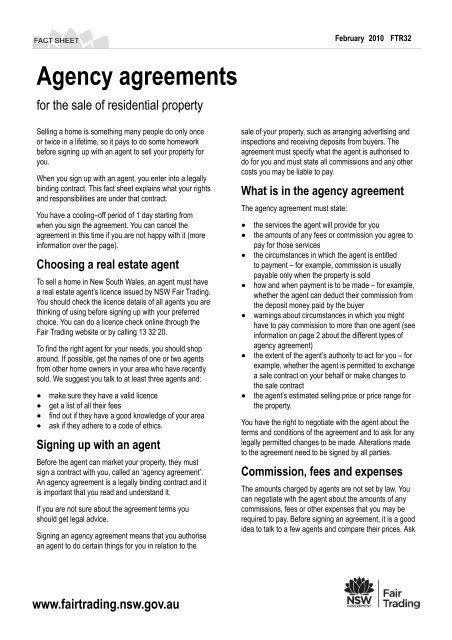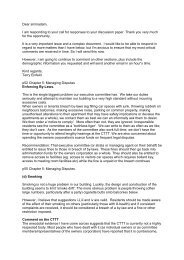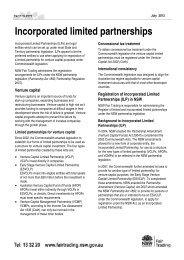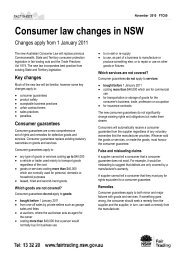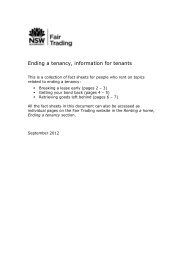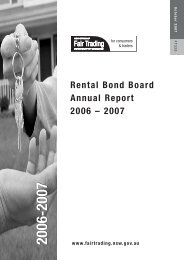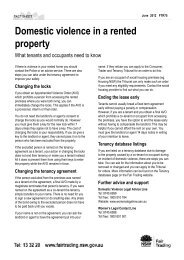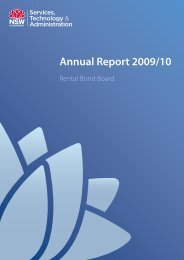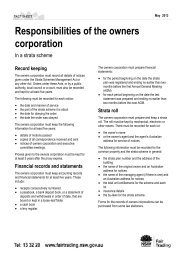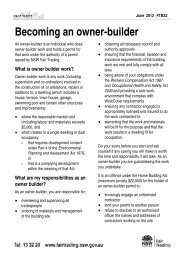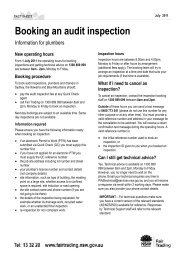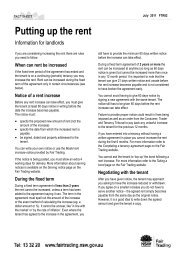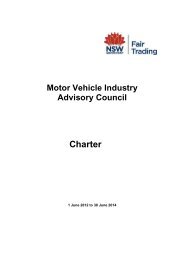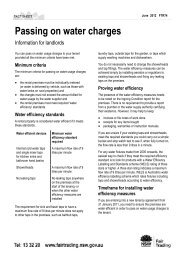Agency Agreements for sale of residential property - NSW Fair Trading
Agency Agreements for sale of residential property - NSW Fair Trading
Agency Agreements for sale of residential property - NSW Fair Trading
Create successful ePaper yourself
Turn your PDF publications into a flip-book with our unique Google optimized e-Paper software.
<strong>Agency</strong> agreements<br />
<strong>for</strong> the <strong>sale</strong> <strong>of</strong> <strong>residential</strong> <strong>property</strong><br />
Selling a home is something many people do only once<br />
or twice in a lifetime, so it pays to do some homework<br />
be<strong>for</strong>e signing up with an agent to sell your <strong>property</strong> <strong>for</strong><br />
you.<br />
When you sign up with an agent, you enter into a legally<br />
binding contract. This fact sheet explains what your rights<br />
and responsibilities are under that contract.<br />
You have a cooling–<strong>of</strong>f period <strong>of</strong> 1 day starting from<br />
when you sign the agreement. You can cancel the<br />
agreement in this time if you are not happy with it (more<br />
in<strong>for</strong>mation over the page).<br />
Choosing a real estate agent<br />
To sell a home in New South Wales, an agent must have<br />
a real estate agent’s licence issued by <strong>NSW</strong> <strong>Fair</strong> <strong>Trading</strong>.<br />
You should check the licence details <strong>of</strong> all agents you are<br />
thinking <strong>of</strong> using be<strong>for</strong>e signing up with your preferred<br />
choice. You can do a licence check online through the<br />
<strong>Fair</strong> <strong>Trading</strong> website or by calling 13 32 20.<br />
To find the right agent <strong>for</strong> your needs, you should shop<br />
around. If possible, get the names <strong>of</strong> one or two agents<br />
from other home owners in your area who have recently<br />
sold. We suggest you talk to at least three agents and:<br />
● make sure they have a valid licence<br />
● get a list <strong>of</strong> all their fees<br />
● find out if they have a good knowledge <strong>of</strong> your area<br />
● ask if they adhere to a code <strong>of</strong> ethics.<br />
Signing up with an agent<br />
Be<strong>for</strong>e the agent can market your <strong>property</strong>, they must<br />
sign a contract with you, called an ‘agency agreement’.<br />
An agency agreement is a legally binding contract and it<br />
is important that you read and understand it.<br />
If you are not sure about the agreement terms you<br />
should get legal advice.<br />
Signing an agency agreement means that you authorise<br />
an agent to do certain things <strong>for</strong> you in relation to the<br />
www.fairtrading.nsw.gov.au<br />
February 2010 FTR32<br />
<strong>sale</strong> <strong>of</strong> your <strong>property</strong>, such as arranging advertising and<br />
inspections and receiving deposits from buyers. The<br />
agreement must specify what the agent is authorised to<br />
do <strong>for</strong> you and must state all commissions and any other<br />
costs you may be liable to pay.<br />
What is in the agency agreement<br />
The agency agreement must state:<br />
● the services the agent will provide <strong>for</strong> you<br />
● the amounts <strong>of</strong> any fees or commission you agree to<br />
pay <strong>for</strong> those services<br />
● the circumstances in which the agent is entitled<br />
to payment – <strong>for</strong> example, commission is usually<br />
payable only when the <strong>property</strong> is sold<br />
● how and when payment is to be made – <strong>for</strong> example,<br />
whether the agent can deduct their commission from<br />
the deposit money paid by the buyer<br />
● warnings about circumstances in which you might<br />
have to pay commission to more than one agent (see<br />
in<strong>for</strong>mation on page 2 about the different types <strong>of</strong><br />
agency agreement)<br />
● the extent <strong>of</strong> the agent’s authority to act <strong>for</strong> you – <strong>for</strong><br />
example, whether the agent is permitted to exchange<br />
a <strong>sale</strong> contract on your behalf or make changes to<br />
the <strong>sale</strong> contract<br />
● the agent’s estimated selling price or price range <strong>for</strong><br />
the <strong>property</strong>.<br />
You have the right to negotiate with the agent about the<br />
terms and conditions <strong>of</strong> the agreement and to ask <strong>for</strong> any<br />
legally permitted changes to be made. Alterations made<br />
to the agreement need to be signed by all parties.<br />
Commission, fees and expenses<br />
The amounts charged by agents are not set by law. You<br />
can negotiate with the agent about the amounts <strong>of</strong> any<br />
commissions, fees or other expenses that you may be<br />
required to pay. Be<strong>for</strong>e signing an agreement, it is a good<br />
idea to talk to a few agents and compare their prices. Ask
each agent <strong>for</strong> a printed list <strong>of</strong> their fees and commission<br />
rates and the expenses they charge.<br />
Disclosure <strong>of</strong> rebates and discounts<br />
The agency agreement may require you to pay the<br />
agent <strong>for</strong> certain expenses in relation to the <strong>sale</strong> <strong>of</strong> your<br />
home, such as advertising, auctioneer’s fee, or any<br />
other services the agent may arrange <strong>for</strong> you, such as<br />
cleaning, decorating or landscaping.<br />
Sometimes the amount the agent has to pay <strong>for</strong> the<br />
service is less than what you are being asked to pay.<br />
This can occur if the agent receives a commission or<br />
discount from the provider <strong>of</strong> the service <strong>for</strong> being a<br />
regular customer – <strong>for</strong> example, some newspapers pay<br />
a commission to the agency at the end <strong>of</strong> the year based<br />
on how much advertising was placed.<br />
The agency agreement must state the amounts or<br />
estimated amounts <strong>of</strong> any such commissions or<br />
discounts and from whom they are received. You can<br />
negotiate with the agent about whether you should pay<br />
the full amount.<br />
Ending the agreement<br />
The agency agreement usually has a specified period<br />
(a ‘fixed term’) during which the agreement cannot<br />
be ended unless you and the agent both agree. If the<br />
agreement is open ended (that is, it does not have a<br />
fixed term) it must state how the agreement can be<br />
ended.<br />
The length <strong>of</strong> any fixed term is negotiated between you<br />
and the agent, there is no minimum or maximum set<br />
term. The fixed term will depend on how long you and the<br />
agent think it will take to sell the <strong>property</strong>.<br />
If the fixed term is longer than 90 days, you can give<br />
the agent 30 days written notice to end the agreement<br />
after 90 days. Of course, if the fixed term has less than<br />
30 days left to run, you can just give notice to end the<br />
agreement at the end <strong>of</strong> the fixed term – check your<br />
agreement to see how much notice you need to give. If<br />
you are not sure how to end the agreement, you should<br />
seek legal advice.<br />
www.fairtrading.nsw.gov.au<br />
February 2010 FTR32<br />
If you are not happy with an agent’s services, it is<br />
important to properly end your agreement with them<br />
be<strong>for</strong>e signing up with another agent. Otherwise both<br />
agents may charge you commission when the <strong>property</strong> is<br />
sold.<br />
Types <strong>of</strong> agency agreements<br />
There are several different kinds <strong>of</strong> agency agreements<br />
<strong>for</strong> the <strong>sale</strong> <strong>of</strong> <strong>residential</strong> <strong>property</strong>. It is important to be<br />
aware <strong>of</strong> the kind <strong>of</strong> agreement you sign, because it<br />
affects your rights and the amount <strong>of</strong> commission you<br />
may have to pay. You should discuss the agreement<br />
with a legal adviser if you are not sure about your rights.<br />
The following is an overview <strong>of</strong> the different types <strong>of</strong><br />
agreements.<br />
Exclusive agency agreements<br />
Exclusive agency agreements are commonly used <strong>for</strong> the<br />
<strong>sale</strong> <strong>of</strong> <strong>residential</strong> <strong>property</strong>. In this kind <strong>of</strong> agreement, you<br />
give exclusive rights to one agent to sell your <strong>property</strong>.<br />
This may entitle the agent to be paid commission if the<br />
<strong>property</strong> is sold during the fixed term <strong>of</strong> the agreement,<br />
even if the <strong>property</strong> is sold by you or by another agent.<br />
The agent may also be entitled to commission if the<br />
<strong>property</strong> later sells to a person who started negotiating<br />
<strong>for</strong> the <strong>property</strong> with the original agent.<br />
Sole agency agreements<br />
This is similar to an exclusive agency agreement. You<br />
give rights to one agent to sell the <strong>property</strong> but you may<br />
find a buyer yourself. If you find a buyer who has not<br />
been introduced by the agent, then no commission is<br />
payable to the agent.<br />
General listing / Open agency agreement<br />
This lets you list your <strong>property</strong> with a number <strong>of</strong> agents.<br />
You pay a commission to the agent who finds the buyer.<br />
Multiple listing<br />
This occurs when you deal with an agent who is part<br />
<strong>of</strong> a network <strong>of</strong> agents working together to sell your<br />
home. It covers both auction and private treaty. You pay<br />
a commission to the agent you signed up with.
Auction agency agreement<br />
This is effectively an exclusive agency agreement where<br />
the <strong>property</strong> is listed <strong>for</strong> auction.<br />
Cooling–<strong>of</strong>f period<br />
The agency agreement becomes binding when the<br />
principal (that is, you as the owner/s <strong>of</strong> the <strong>property</strong>, or<br />
someone who is legally acting <strong>for</strong> you) and the agent<br />
have signed it. There is then a cooling–<strong>of</strong>f period <strong>of</strong> 1<br />
business day during which you can cancel (or ‘rescind’)<br />
the agreement. Saturday is included <strong>for</strong> the purposes <strong>of</strong><br />
the cooling–<strong>of</strong>f period, but public holidays are not.<br />
The cooling–<strong>of</strong>f period starts when you sign the<br />
agreement and ends at 5pm on the next business day or<br />
Saturday. For example, if you sign the agreement on a<br />
Friday, the cooling‑<strong>of</strong>f period ends at 5pm on Saturday.<br />
If you sign up on Saturday, the cooling–<strong>of</strong>f period would<br />
usually end at 5pm on Monday, unless that is a public<br />
holiday, in which case it will end at 5pm on Tuesday.<br />
The cooling–<strong>of</strong>f period gives you time to read the<br />
agreement, consider the terms you have agreed to,<br />
including the agent’s fees, and get independent advice if<br />
you have concerns about any aspect <strong>of</strong> the agreement.<br />
Talk to the agent – they may be willing to change things<br />
in the agreement that you are not happy about.<br />
Cancelling the agreement during the cooling–<br />
<strong>of</strong>f period<br />
If you decide to cancel (or ‘rescind’) the agreement<br />
during the cooling–<strong>of</strong>f period, you need to deliver a<br />
‘notice <strong>of</strong> rescission’ to the agent.<br />
This simply means giving the agent a written notice or<br />
letter which:<br />
● is addressed to the agent (use their name as given in<br />
the agency agreement),<br />
● states that you are rescinding the agreement, and<br />
● is signed by you (and any other person named on the<br />
agreement as a principal) or by your solicitor/s.<br />
You can hand the notice to the agent in person, deliver it<br />
to or leave it at the agent’s <strong>of</strong>fice or the agent’s address<br />
www.fairtrading.nsw.gov.au<br />
February 2010 FTR32<br />
as given in the agency agreement, or fax it to the agent.<br />
Make sure to keep a copy <strong>for</strong> your records.<br />
The agent cannot charge you any fees or costs in<br />
relation to an agreement that has been rescinded<br />
correctly. Any money you have already paid to the agent<br />
must be refunded to you.<br />
Waiving your cooling–<strong>of</strong>f rights<br />
If you are sure that you wish to go ahead with the agency<br />
agreement, you can waive, or <strong>for</strong>ego, your right to a<br />
cooling–<strong>of</strong>f period by signing a separate waiver <strong>for</strong>m<br />
when you sign the agreement.<br />
The cooling–<strong>of</strong>f period can be waived only if the agent<br />
gave you the following documents at least 1 business<br />
day be<strong>for</strong>e you signed the agency agreement:<br />
● a copy <strong>of</strong> the proposed (unsigned) agency<br />
agreement, and<br />
● a copy <strong>of</strong> this fact sheet.<br />
For example, on Thursday morning the agent gives<br />
you a copy <strong>of</strong> the unsigned agreement and this fact<br />
sheet, which you read and consider carefully. On Friday<br />
afternoon you sign the agency agreement and the waiver<br />
<strong>for</strong>m. The agency agreement immediately becomes<br />
binding and the agent can get to work on selling your<br />
home.<br />
The Contract <strong>of</strong> Sale<br />
A <strong>residential</strong> <strong>property</strong> cannot be advertised <strong>for</strong> <strong>sale</strong> until<br />
a Contract <strong>of</strong> Sale has been prepared. The contract<br />
must contain a copy <strong>of</strong> the title documents, drainage<br />
diagram and the Zoning Certificate (s 149) issued by the<br />
local council. Property exclusions must also be included<br />
and a statement <strong>of</strong> the buyer’s cooling <strong>of</strong>f rights must<br />
be attached. The draft contract must be available <strong>for</strong><br />
inspection at the agent’s <strong>of</strong>fice. It is important that you<br />
consult your solicitor or conveyancer about preparing the<br />
contract to make sure that everything is in order.
Exchange <strong>of</strong> contracts<br />
The contract exchange is a critical point in the <strong>sale</strong><br />
process:<br />
● The buyer or seller is not legally bound until signed<br />
copies <strong>of</strong> the contract are exchanged.<br />
● Buyers <strong>of</strong> <strong>residential</strong> <strong>property</strong> usually have a<br />
cooling–<strong>of</strong>f period <strong>of</strong> 5 working days following<br />
the exchange <strong>of</strong> contracts during which they can<br />
withdraw from the <strong>sale</strong>.<br />
● If the agent arranges exchange <strong>of</strong> contracts, the<br />
agent must give copies <strong>of</strong> the signed contract to<br />
each party or their solicitor or conveyancer within 2<br />
business days.<br />
● The cooling–<strong>of</strong>f period can be waived, reduced or<br />
extended by negotiation.<br />
● There is no cooling–<strong>of</strong>f period <strong>for</strong> sellers. Once<br />
contracts have been exchanged, sellers are<br />
generally bound to complete the agreement.<br />
● There is no cooling–<strong>of</strong>f period when purchasing at<br />
auction.<br />
If you encounter problems<br />
If an issue arises during the <strong>sale</strong> process that you are<br />
unhappy with, check your copy <strong>of</strong> the selling agency<br />
agreement to clarify your rights and obligations.<br />
Try to sort out the problem by talking to the agent.<br />
Make certain that any instructions you give the agent<br />
are in writing, and keep a copy. If you think the agent<br />
has charged a fee to which they are not entitled, or<br />
believe the fee charged is excessive, you can apply to<br />
the Consumer, Trader and Tenancy Tribunal to settle the<br />
matter.<br />
Other tips<br />
If you need further assistance to resolve a problem,<br />
consider the following:<br />
● If your agent is a member <strong>of</strong> a pr<strong>of</strong>essional<br />
association, contact that association. They can be<br />
helpful in resolving disputes.<br />
www.fairtrading.nsw.gov.au<br />
<strong>Fair</strong> <strong>Trading</strong> enquiries 13 32 20<br />
TTY 1300 723 404<br />
Language assistance 13 14 50<br />
This fact sheet must not be relied<br />
on as legal advice. For more<br />
in<strong>for</strong>mation about this topic, refer to<br />
the appropriate legislation.<br />
www.fairtrading.nsw.gov.au<br />
February 2010 FTR32<br />
● You can also seek legal advice from a solicitor or the<br />
Chamber Magistrate at your nearest Local Court.<br />
● If your complaint concerns your solicitor, you can<br />
lodge a complaint with the Office <strong>of</strong> the Legal<br />
Services Commissioner.<br />
● If your complaint concerns your conveyancer, you<br />
can lodge a complaint with <strong>NSW</strong> <strong>Fair</strong> <strong>Trading</strong>.<br />
More in<strong>for</strong>mation<br />
<strong>NSW</strong> <strong>Fair</strong> <strong>Trading</strong> can give you more in<strong>for</strong>mation about<br />
the laws applying to <strong>property</strong> <strong>sale</strong>s and agents. Contact<br />
<strong>Fair</strong> <strong>Trading</strong> on 13 32 20 or visit the <strong>Fair</strong> <strong>Trading</strong> website.<br />
© State <strong>of</strong> New South Wales through <strong>NSW</strong> <strong>Fair</strong> <strong>Trading</strong><br />
You may freely copy, distribute, display or download this in<strong>for</strong>mation with<br />
some important restrictions. See <strong>NSW</strong> <strong>Fair</strong> <strong>Trading</strong>'s copyright policy at<br />
www.fairtrading.nsw.gov.au or email publications@services.nsw.gov.au


